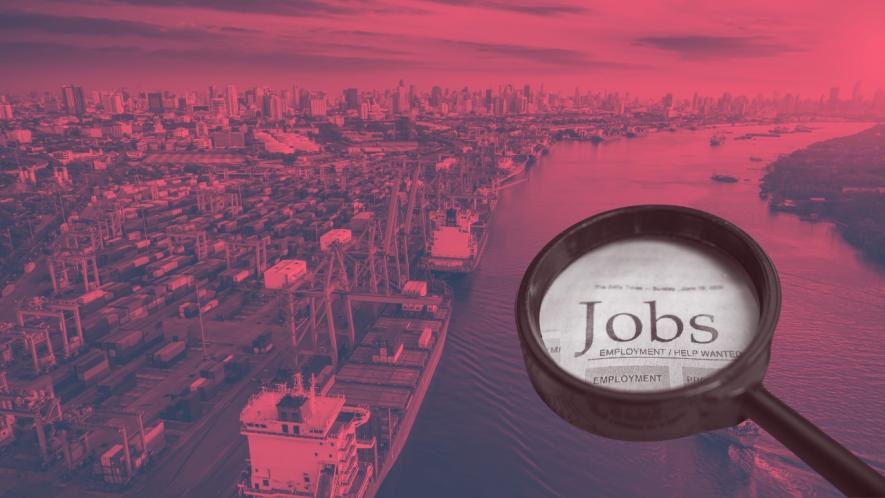Free Trade Isn’t a Good Thing; It Creates Unemployment

Imagine a country that is exposed to relatively unrestricted trade. There are two obvious problems that it can face because of this trade policy: the first is a balance of payments problem, because its exports are insufficient relative to its imports. And the second is the creation of unemployment, and more generally of domestic resources remaining idle, because domestic goods cannot compete with imports.
These two (balance of payment and unemployment) are not identical problems, in the sense that there can be unemployment in the absence of an import surplus, as had happened in the colonial period when there was domestic “deindustrialisation” causing massive unemployment among artisans and craftsmen even though the Indian economy did not have an import surplus (in fact it had an export surplus which was simply appropriated by the colonial rulers as “drain”). In what follows, however, I shall not be concerned with the balance of payments problems caused in a Third World economy because of relatively unrestricted trade; I shall concentrate only on the employment question.
The fact that unrestricted trade creates domestic unemployment is quite obvious, and should be especially obvious to Third World people who have had the historical experience of deindustrialisation during colonial rule. Yet, there is a general impression around that free trade is a good thing, and an utterly spurious argument is advanced to create this impression.
Indeed, the so-called global trade rules evolved under the WTO (World Trade Organisation) are based precisely on this argument. This argument states that countries should specialise in the production of those goods where they have a “comparative advantage”. If each country specialises in the production of those goods at which it is adept, then taking the world as a whole output would be larger than otherwise, so that all countries can become better off.
This free trade argument based on “comparative advantage” (which by the way is the only argument for free trade) is a complete fiddle. It assumes, simply assumes, that in each country and hence in the world as a whole, there is always full employment of all resources including of its total labour force, irrespective of whether it is engaging in trade or not. It follows that if all resources, including its labour-force, are fully employed before and after trade, then all that trade involves is a mere redirection of resources from one kind of use to another. It cannot by assumption cause the unemployment of any resource including a country’s labour force.
Once we reject this assumption, however, as we must since it has no basis either in facts or in theory (its theoretical vacuity was demonstrated by Michal Kalecki and John Maynard Keynes in the 1930s, though Marx had anticipated their theoretical innovation three quarters of a century earlier), the potentially deleterious implications of free trade for a country become clear.
There is a very simple way of seeing this. Suppose the total production capacity of the world economy is 100 units; if total demand in the world economy is 80 units, then 20 units of world output would remain unrealised, and hence, under capitalist conditions, unproduced. The resources that remain unemployed as a result, will be distributed among the countries in a certain manner.
A question may be raised here. Keynes, afraid of the workers being disillusioned with capitalism because of the unemployment it generates and hence moving towards socialism, had suggested State intervention in a capitalist system to raise the level of aggregate demand and hence employment. Why can this not be attempted at the world level itself, in which case no country would be left with unutilised resources even in the event of free trade?
The very simple and obvious answer to this question, even without going into any complexities, is that for this to happen there has to be a world State with a world government, which there isn’t under capitalism.
And in countries where resources remain unutilised because the world demand is not large enough, if their particular states attempted to raise demand in those economies to create larger unemployment, then under free trade conditions this extra demand might “leak out” resulting in additional imports and hence an unsustainable trade deficit. If these countries did not have free trade and could protect their economies, then their governments could expand domestic aggregate demand and hence employment. But their hands get tied because of free trade.
The fact that under a free trade regime a country’s government cannot intervene to raise aggregate demand, and hence employment, but has to accept meekly the fall-out of the consequences of whatever the level of world demand happens to be, means that employment, whether in a particular country or at the world level, might well be lower with free trade than if countries could resort to protection.
This totally negates the fundamental argument for free trade. This argument, it may be recalled, hinged on the fact that each country, specialising in producing only those goods where its comparative advantage lay, would increase world output which would be potentially beneficial for all countries. But, this argument collapses once we recognise that post-free trade world output might be lower than pre-free trade world output, if the level of world aggregate demand in the former situation shrinks compared with the latter.
What, it may be asked, does the post-free trade world aggregate demand depend upon? The primary determinant of world aggregate demand is the demand generated within the leading capitalist country, in the present context the United States, which enjoys a degree of autonomy in generating demand even when this demand “leaks out” to other countries. This is because it does not have to worry about a trade deficit, as its currency is generally considered to be “as good as gold” and it can simply print money to finance its external deficits which the rest of the world would be willing to hold.
It is for this reason that consumption plus investment plus government expenditure in the US becomes the primary determinant of world aggregate demand. Government expenditure of the US, in particular, is important here because it has a certain autonomy: it can be turned on like a tap. In this sense the US State, despite being a nation-state, can potentially act, and even actually acts up to a point, as a surrogate world-state in conditions of contemporary capitalism.
There is, however, a contradiction here which is now beginning to make itself felt. While the US State can act as a surrogate world state, it is not a world state; it remains, everything said and done, a nation-state after all. If the US State increases domestic aggregate demand which “leaks out”, then, even though the US may not have any problems in financing its external deficit, it gets indebted while financing its external deficit. And it gets indebted while generating employment, most of which is located abroad (since demand “leaks out”).
An enlarging through larger government expenditure of US aggregate demand, therefore, while it may not raise any technical problems for the US in the sense of being unsustainable, militates against its narrowly national point of view, which its State cannot ignore as it is after all a nation-state. Its nation-state role, in short, comes in the way of its surrogate world-state role.
This contradiction is now reaching an acute form. During the pandemic the US (and other advanced countries) ran large fiscal deficits to finance the provision of relief to their populations. Even after the pandemic was over, the US was keen to continue with relatively larger fiscal deficits for reviving domestic aggregate demand, but was somewhat thwarted by the recent upsurge of inflation.
But once this upsurge abates, there is likely to be a stimulus to domestic demand in the US by State expenditure, but this would be accompanied by protectionism to prevent any “leaking out” of demand to other countries. In fact, the US, for some time, has been moving toward protectionism, most clearly directed against China, but also vis-à-vis other Third World countries.
Some have called this move toward protectionism in the US “de-globalisation” but that is not correct. While there is this tendency to introduce protectionism, no restrictions are being placed by the US on the movement of finance capital.
Indeed, on the contrary, any Third World country imposing capital controls faces victimisation by the US. Such contradictions, however, do not bother the US. After all, it is a country that is going protectionist even while preaching the virtues of free trade to the rest of the world.
Get the latest reports & analysis with people's perspective on Protests, movements & deep analytical videos, discussions of the current affairs in your Telegram app. Subscribe to NewsClick's Telegram channel & get Real-Time updates on stories, as they get published on our website.
























